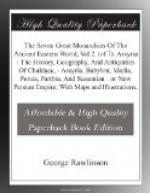Another unpleasant feature in the Assyrian character—but one at which we can feel no surprise—was their pride. This is the quality which draws forth the sternest denunciations of Scripture, and is expressly declared to have called down the Divine judgments upon the race. Isaiah, Ezekiel, and Zephaniah alike dwell upon it. It pervades the inscriptions. Without being so rampant or offensive as the pride of some Orientals—as, for instance, the Chinese, it is of a marked and decided color: the Assyrian feels himself infinitely superior to all the nations with whom he is brought into contact; he alone enjoys the favor of the gods; he alone is either truly wise or truly valiant; the armies of his enemies are driven like chaff before him; he sweeps them away, like heaps of stubble; either they fear to fight, or they are at once defeated; he carries his victorious arms just as far as it pleases him, and never under any circumstances admits that he has suffered a reverse. The only merit that he allows to foreigners is some skill in the mechanical and mimetic arts, and his acknowledgment of this is tacit rather than express, being chiefly known from the recorded fact that he employs foreign artists to ornament his edifices.
According to the notions which the Greeks derived from Ctesias, and passed on to the Romans, and through them to the moderns generally, the greatest defect in the Assyrian character—the besetting sin of their leading men—was luxuriousness of living and sensuality. From Ninyas to Sardanapalus—from the commencement to the close of the Empire—a line of voluptuaries, according to Ctesias and his followers, held possession of the throne; and the principle was established from the first, that happiness consisted in freedom from all cares or troubles, and unchecked indulgence in every species of sensual pleasure. This account, intrinsically suspicious, is now directly contradicted by the authentic records which we possess of the warlike character and manly pursuits of so many of the kings. It probably, however, contains a germ of truth. In a flourishing kingdom like Assyria, luxury must have gradually advanced; and when the empire fell under the combined attack of its two most powerful neighbors, no doubt it had lost much of its pristine vigor. The monuments lend some support to the view that luxury was among the causes which produced the fall of Assyria; although




